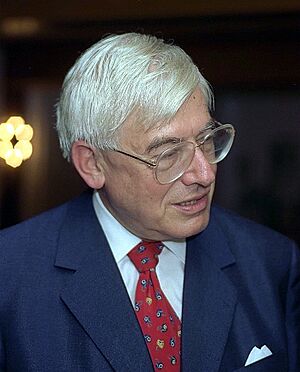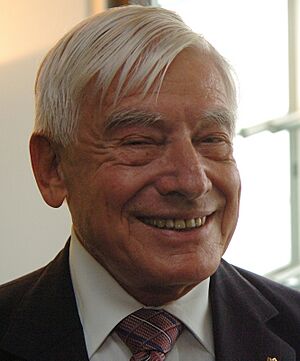Christian Schwarz-Schilling facts for kids
Quick facts for kids
Christian Schwarz-Schilling
|
|
|---|---|

Schwarz-Schilling in 1993
|
|
| High Representative for Bosnia and Herzegovina | |
| In office 1 February 2006 – 30 June 2007 |
|
| Preceded by | Paddy Ashdown |
| Succeeded by | Miroslav Lajčák |
| Federal Minister of Post and Telecommunications | |
| In office 4 October 1982 – 17 December 1992 |
|
| Chancellor | Helmut Kohl |
| Preceded by | Hans Matthöfer |
| Succeeded by | Wolfgang Bötsch |
| Personal details | |
| Born |
Christian Schwarz-Schilling
19 November 1930 Innsbruck, Tyrol, Austrian Republic |
| Nationality | German |
| Political party | Christian Democratic Union |
| Spouse | Marie-Luise Jonen |
| Children | 2 |
| Alma mater | Ludwig Maximilian University of Munich |
| Occupation |
|
Christian Schwarz-Schilling (born 19 November 1930) is a German politician and businessman. He was born in Austria. He is known for his work in media and telecommunications. From 2006 to 2007, he served as the High Representative for Bosnia and Herzegovina. This was an important role in helping Bosnia and Herzegovina after a difficult period.
Contents
Christian Schwarz-Schilling's Early Life and Education
In 1950, Christian Schwarz-Schilling finished high school in Berlin. He then went on to study History and East Asian Languages and Culture. He attended the Ludwig Maximilian University in Munich, Germany. In 1956, he earned his Ph.D. (a high university degree). His research focused on Chinese History.
Christian Schwarz-Schilling's Career in Business and Media
After his studies, Schwarz-Schilling became a manager. From 1957 to 1982, he managed a battery company called Accumulatorenfabrik Sonnenschein. Later, from 1993 to 2002, he led his own company. This company, Dr. Schwarz-Schilling & Partner GmbH, advised on telecommunications.
He also worked in the media industry. In 1971, he joined the Television Council of ZDF. This is one of Germany's public TV stations. He was also a leader in media policy for the CDU/CSU political parties.
Christian Schwarz-Schilling's Political Journey
Schwarz-Schilling became interested in politics in the 1960s. He joined the Christian Democratic Union (CDU) in 1960. He quickly became involved in regional politics in Hesse, a German state. In 1966, he was elected to the Hesse regional parliament. The next year, he became a top leader for the CDU in Hesse.
National Politics and the Bundestag
By 1971, Schwarz-Schilling started working in national politics. In 1976, he was elected to the Bundestag. This is the German parliament. He served there until 2002. During this time, he supported small businesses. He was a vice-chairman of the Small Business Union for many years. He also led a European small business group.
He was very interested in new technology. From 1981 to 1982, he led a committee in the Bundestag. This committee focused on new information and communication technology. He worked to advance modern communication tools.
Minister of Post and Telecommunications
In 1982, Christian Schwarz-Schilling became the Federal Minister of Post and Telecommunications. He served under Chancellor Helmut Kohl. He held this important job for over ten years. During his time as minister, Germany's communication systems changed a lot.
He helped bring cable television to Germany. He also allowed commercial TV stations to broadcast. The German postal service, Deutsche Post, was privatized. This included its telecommunications part. Schwarz-Schilling also introduced GSM mobile phone technology across Germany. He played a key role in developing GSM with France, Germany, and Italy. By the time he left office, Germany had one of the most advanced communication networks in the world.
Resignation and Human Rights Work
In 1992, Schwarz-Schilling resigned from his minister position. He was very upset about Germany's lack of action during conflicts in Yugoslavia. He felt that Germany should have done more to stop terrible events. He said he was "ashamed" of the government's inaction. He believed that such events should "never happen again."
After leaving his post, he worked to help solve conflicts in Yugoslavia. He continued this role until 2004. He also became involved in human rights. In 1995, he led a committee on Human Rights and Humanitarian Aid. He served as its vice-chairperson until 2002.
Criticism Faced by Christian Schwarz-Schilling
During his time as minister, Christian Schwarz-Schilling faced some criticism. One area of concern was his decision to involve private companies in laying cable. His wife's company was involved in one of these projects. Schwarz-Schilling had previously managed this company. He sold his shares in his battery company just before becoming minister.
Another point of criticism was his choice to use copper cables. Some experts believed that fiber-optic cables were the better "technology of the future." Despite these concerns, he was seen by some as a minister who achieved a lot.
Among the employees of the Deutsche Bundespost (the German postal service), he was not always popular. This was because he was the last minister before the service was privatized.
International Role in Bosnia and Herzegovina
On 14 December 2005, Christian Schwarz-Schilling was chosen for a very important international role. He became the High Representative for Bosnia and Herzegovina. This position was created after the 1995 Dayton Agreement. His job was to help guide Bosnia and Herzegovina towards stability. He started this role on 1 February 2006.
Schwarz-Schilling saw his role as an "advisor." He wanted to "listen to the people" of Bosnia and Herzegovina. This was different from his predecessor, who had used strong powers to make changes. Under Schwarz-Schilling, the High Representative's office became less forceful. This was partly due to pressure from the Council of Europe and more involvement from the European Union.
Research during his time showed that most people in Bosnia and Herzegovina were more open-minded than their politicians. It also showed that some policies did not match what the people wanted. His term ended on 30 June 2007. He was replaced by Slovak diplomat Miroslav Lajčák.
Awards and Recognition
Christian Schwarz-Schilling has received several honors for his work:
- In 1992, he received a high award from the Federal Republic of Germany.
- In 1995, he was given an honorary doctorate degree from Bryant College in the USA.
- In 2004, he became an honorary citizen of the town Büdingen.
- In 2005, he received the Manfred Wörner Medal. This was for his "special service to peace and freedom in Europe."
- In 2007, he received the Hessian Peace Prize. This recognized his efforts to help end conflicts in Bosnia and Herzegovina.
- Since 2007, Schwarz-Schilling has been teaching as a professor at Sarajevo School of Science and Technology.
 | Delilah Pierce |
 | Gordon Parks |
 | Augusta Savage |
 | Charles Ethan Porter |


